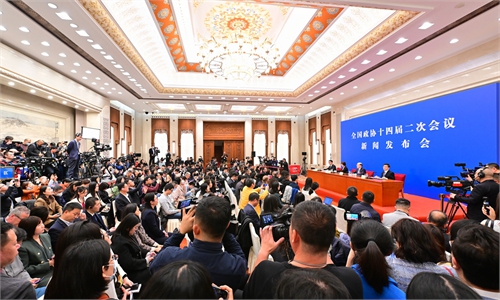AI technology in spotlight during two sessions
Nation capable of developing LLMs with Chinese characteristics

AI Photo:VCG
As the global artificial intelligence (AI) industry kicks off a new wave of development enthusiasm, AI technology is set to be a hot topic during the two sessions, with a number of members of the Chinese People's Political Consultative Conference (CPPCC) National Committee saying that in the AI arena, China should adhere to independent innovation, as the country is capable of taking a development path of large language models (LLMs) with Chinese characteristics.
Xu Jiuping, a member of the CPPCC National Committee and professor at Sichuan University, said on Sunday in a note sent to the Global Times that the Chinese market has the world's largest number of users and active data-producing entities, which is enough to shape many complex new businesses and services. This situation can provide a place for advanced AI technologies and inspire Chinese companies to innovate.
"In the field of AI, we can learn from the experience and practices of organizations such as OpenAI, but we should also find another way to explore more advanced AI technologies," Xu said, noting that the US is not the endgame for AI, and China should insist on independent innovation.
"This kind of ingenuity does not mean getting stuck in a rut, but rather exploring autonomous directions to better serve new needs and promote the international competitiveness of original technologies," Xu said.
China has a huge market and talent reserves, and the population base and sound software and hardware infrastructure also provide a good foundation for data collection. "We should give full play to the spirit of Chinese people who dare to explore and create, in a bid to explore AI technology with the unique scientific ideas of Chinese people," Xu noted.
Zhou Hongyi, another member of the CPPCC National Committee and founder and chairman of 360 Security Technology, said in a note sent to the Global Times that it will take time for China to catch up with the US in the core technology of LLMs.
In terms of LLM application, Zhou noted that China can walk the path of LLM development with Chinese characteristics.
"An important direction for the development of LLMs in China should focus on leveraging the advantages of the industry and various scenarios, combining LLMs with business processes and product functions, and seeking multi-scenario applications, in a bid to accelerate the formation of new productive forces," Zhou noted.
LLMs are like engines, which should be integrated with business activities. Especially in the traditional manufacturing industry, LLMs are powerful tools to promote a digital transformation, Zhou noted.
"Authorities can encourage enterprises to integrate one or two business scenarios with an LLM, thus creating a number of LLMs that can be used across the country, which will have a huge effect on China's industrial digitalization and essentially become an important part of the new productive forces," Zhou said.
China's leading digital economy with its large-scale data resources, diverse data types and rich application scenarios have provided advantages for the country's AI sector, Qi Xiangdong, chairman of Qi An Xin Technology Group, who is also a member of the National Committee of the CPPCC, told the Global Times on Friday.
Qi said that AI depends on data, and China's rapidly developing digital economy provides a large source of data. He added that the total scale of China's digital economy reached 50.2 trillion yuan ($6.97 trillion) in 2022, and the breadth and depth of digital integration in the real economy has expanded.



